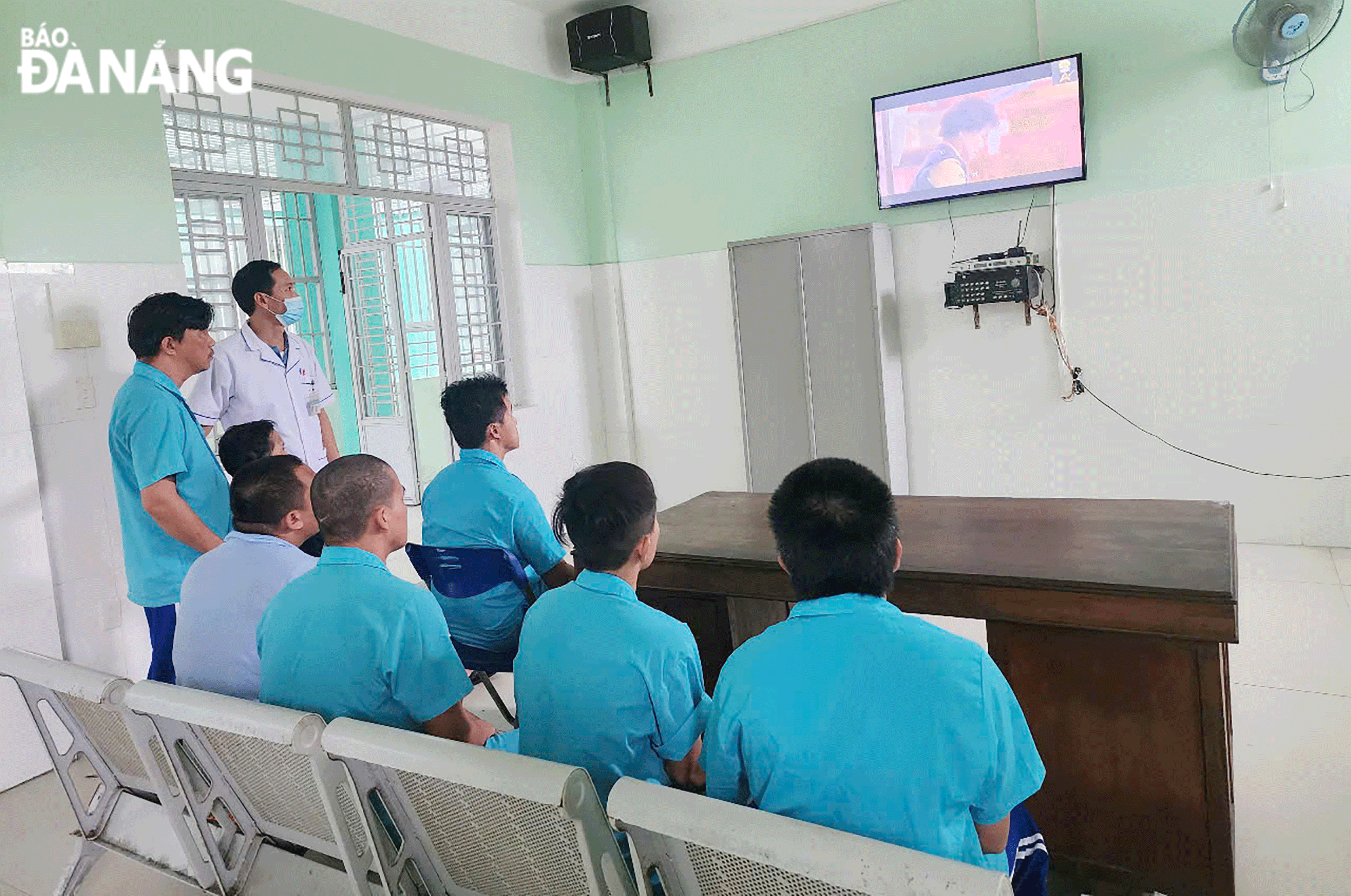Helping patients rediscover themselves
Nursing, often perceived as a profession for women due to its blend of medical expertise and meticulous, compassionate care, is proving otherwise at the Substance Detoxification and Compulsory Treatment Department of Da Nang Mental Hospital. Here, male nurses play a pivotal role in helping patients rediscover their true selves.
 |
| Male nurses at Da Nang Mental Hospital play a pivotal role in helping patients rediscover their true selves. In the photo: Patients watching television for relaxation after treatment. Photo: PHAN CHUNG |
Accompanying patients on their journey to recovery
The entrance to the Substance Detoxification and Compulsory Treatment Department is always locked. Access requires approval from the head of the department or on-duty medical staff. Each treatment area has multiple secured doors, with medical staff having their own keys to unlock and relock as necessary.
The department specialises in treating patients whose behaviour is impaired by substance use, including alcohol, drugs, and stimulants. Most of these cases involve synthetic drug users who experience severe behavioural disruptions and hallucinations.
Le Van Nam, a male nurse with over 15 years of experience at the department, has lost count of how many patients he has helped detox, rehabilitate, and send off with hopes of a fresh start. However, Nam is deeply concerned about the growing number of admissions and the increasingly complex effects of synthetic substances.
Male nurses are particularly vital at this department due to the nature of their work. Patients often arrive in an agitated, uncontrolled state, brought in by family or authorities. Male nurses are the first to stabilise these patients, calming them for medical assessment and treatment.
For highly agitated patients, temporary physical restraints may be necessary to prevent harm to others. Medical treatment then follows, with doctors prescribing medications to alleviate symptoms. Male nurses, often clad in white lab coats, are a common sight as they work together to manage disruptive patients and assist doctors during treatment.
“Our responsibilities here, not just for nurses but also for doctors and medical assistants, are immense. We don't just manage and treat patients’ behaviour; we also act as custodians, ensuring patients are completely cut off from unhealthy external influences. Detoxification requires not only the patient’s determination but also a controlled environment free of temptations,” Nam explained.
The challenges are manifold. Patients often destroy property, verbally abuse, or even assault medical staff. Some, carrying diseases like HIV/AIDS, use their condition to threaten nurses for special treatment. The department is designed to accommodate 45 beds, yet it frequently operates beyond capacity, requiring additional beds to meet the rising demand.
Smuggling contraband substances into the facility remains a persistent issue. Patients and external contacts sometimes attempt to exploit visiting hours to sneak in drugs, hidden in food or personal items. Nam recounted the meticulous checks required: “We have to inspect everything thoroughly—food, bottled water, even personal belongings. A single lapse can ruin multiple lives: the patient’s, their families, and their roommates’ who are striving to recover.”
Haunting realities
Medical staff at the department are familiar with heartbreaking stories, such as a story of a man from Nam Dinh. After falling into substance abuse, he lost everything, including his family, livelihood, and home. Determined to start over, he moved with his family to Hoa Vang District, only to relapse after reconnecting with old acquaintances. Following another failed attempt at recovery, he moved to the Mekong Delta, far from friends and temptations, to try rebuilding his life again.
“Today’s synthetic drugs are overwhelmingly potent. Even the most determined individuals find it difficult to escape their grip, especially in environments rife with temptation,” Nam lamented. He added that many patients come from broken families, burdened by poverty and social difficulties, creating a cycle of despair that is hard to break.
Dr Nguyen Cuu Thanh, Head of the department, highlighted the unique challenges faced by the team: “Male nurses here take on multiple roles—not just healthcare providers but also protectors and counsellors. They face daily dangers, especially during the critical first three days of treatment when patients often exhibit aggressive behaviour.”
Nurses must balance firmness with empathy, providing medical care while addressing patients’ psychological needs. “Substance abuse isn’t just a medical issue; it’s a societal one with far-reaching consequences. Our mission is to help these individuals reclaim their lives with both logic and compassion,” Thanh said.
Reporting by PHAN CHUNG - Translating by TRUC VY, T.TUNG








